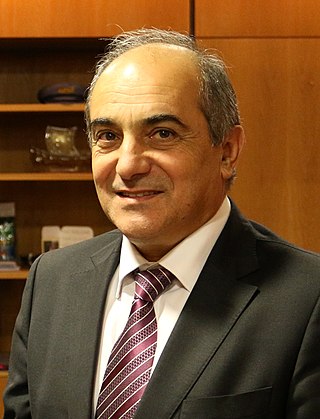Related Research Articles

A member of the European Parliament (MEP) is a person who has been elected to serve as a popular representative in the European Parliament.

Northern Cyprus, officially the Turkish Republic of Northern Cyprus, is a de facto state that comprises the northeastern portion of the island of Cyprus. Recognised only by Turkey, Northern Cyprus is considered by the international community to be part of the Republic of Cyprus.

The Progressive Party of Working People is a Marxist–Leninist communist party in Cyprus.
This is a list giving breakdowns of the European Parliamentary session from 1999 to 2004.
This is a list giving breakdowns of the members serving in the European Parliamentary session from 2004 to 2009, following the 2004 election. For a full single list, see: List of members of the European Parliament 2004–2009.

The Politics of Northern Cyprus takes place in a framework of a semi-presidential representative democratic republic, whereby the president is head of state and the prime minister is the head of government, and of a multi-party system. Executive power is exercised by the government. Legislative power is vested in both the government and the Assembly of the Republic. The judiciary is independent of the executive and the legislature.

The House of Representatives is the national unicameral legislature of the Republic of Cyprus. Members and three observers representing Armenian, Latin, and Maronite Cypriots are elected by proportional representation every five years. 30% of seats are allocated to Turkish Cypriots, but these have been vacant since 1964. The House of Representatives of Cyprus is the only legislature in Europe within a fully presidential system.

The Assembly of the Republic is the parliament of the Turkish Republic of Northern Cyprus. It has 50 members, elected for a five-year term by mitigated proportional representation. A party must cross the electoral threshold to be awarded any seats. The parliament is composed of 50 MPs, chosen from six electoral districts, which are coterminous with the districts of Northern Cyprus: Lefkoşa, Gazimağusa, Girne, Güzelyurt, Lefke and İskele.

Lesbian, gay, bisexual, and transgender (LGBT) persons in Cyprus face legal challenges not experienced by non-LGBT residents. Both male and female same-sex sexual activity are legal in Cyprus since 1998, and civil unions which grant several of the rights and benefits of marriage have been legal since December 2015. Conversion therapy was banned in Cyprus in May 2023.

The visa policy of the Schengen Area is a component within the wider area of freedom, security and justice policy of the European Union. It applies to the Schengen Area and to other EU member states except Ireland. The visa policy allows nationals of certain countries to enter the Schengen Area via air, land or sea without a visa for stays of up to 90 days within a 180-day period. Nationals of certain other countries are required to have a visa either upon arrival or in transit.

Northern Cyprus is recognised only by Turkey, a country which facilitates many of its contacts with the international community. After it was occupied by Turkey, Northern Cyprus' relations with the rest of the world were further complicated by a series of United Nations resolutions which declared its independence legally invalid. A 2004 UN Referendum on settling the Cyprus dispute was accepted by the Turkish Cypriots but rejected by the Greek Cypriots. After that, the European Union declared its intentions to assist in reducing the economic isolation of Northern Cyprus and began giving aid to the territory. However, due to pressure from Greece and the Republic of Cyprus, this aid coming from EU funds cannot be used on Greek Cypriot land and property nor on public bodies. As a result, these funds can be used only on 29 percent of people on the island of Cyprus.

The largest expansion of the European Union (EU), in terms of number of states and population, took place on 1 May 2004.

The Eurogroup is the recognised collective term for the informal meetings of the finance ministers of the eurozone—those member states of the European Union (EU) which have adopted the euro as their official currency. The group has 20 members. It exercises political control over the currency and related aspects of the EU's monetary union such as the Stability and Growth Pact. The current President of the Eurogroup is Paschal Donohoe, the Minister for Public Expenditure, National Development Plan Delivery and Reform of Ireland.

Turkish Cypriots and the European Union have somewhat strained relations because the European Union (EU) does not recognise the self-declared Turkish Republic of Northern Cyprus.

The Council of Europe was founded on 5 May 1949 by ten western and northern European states, with Greece joining three months later, and Iceland, Turkey and West Germany joining the next year. It now has 46 member states, with Montenegro being the latest to join.

Demetris Syllouris is a Greek-Cypriot politician. He is the former president of the Cypriot parliament and was the leader of the European Party between 2005 and 2016.

An election was held on 26 May 2019 to elect six representatives from Cyprus to the European Parliament.

Lefteris Christoforou is a Greek Cypriot politician. He has been a Member of the European Parliament (MEP) since 2014 and is Head of National Delegation in the European People's Party. He is a member of the Democratic Rally (DISY) and he served as Vise President from 2003 to 2013 and also as Deputy Chairman from 2013 to 2019. He was a member of the Cyprus of Parliament from 1996 to 2014 and represented Famagusta.